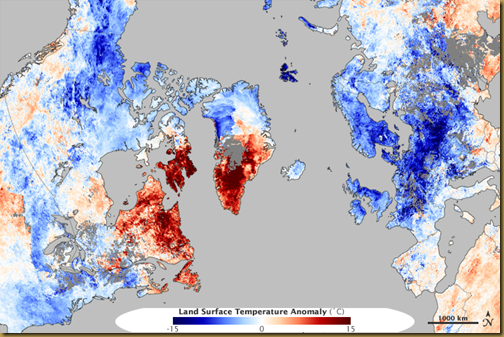(Íslenska neðan við myndina)
The Atlantic Oscillation (AO) has caused cold temperature throughout most of Europe and USA. However, parts of Greenland for instance, have been unseasonably warm.
The image below shows the temperature anomaly for 3 – 10 Desember 2010, as compared to the average for the same dates in 2002 – 2009.

NASA Earth Observatory image created by Jesse Allen, using data provided courtesy of the NASA/GSFC Distributed Active Archive Center. Caption by Holli Riebeek.
Svokölluð AO sveifla, sem ræðast af þrýstingsmun milli háþrýstisvæði nær miðbaug og lágrþrýstisvæða yfir heimskautinu, er nú í þeim fasa (kallaður neikvæður, lítill þrýstimunur) að kalt er víða í Evrópu og BNA, en hlýtt t.d. á Grænlandi.
Myndin hér að ofan sýnir hitafrávik fyrir dagana 3 – 10. desember, 2010, í samanburði við meðaltal sömu daga árin 2002 – 2009.